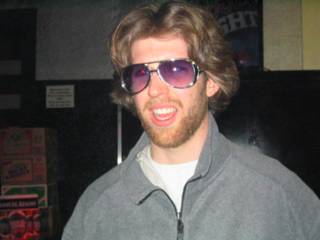I Would Have Asked "Why Was The Music At Coventry So Awful?" ...
...but again, this may be why I can't interview members of Phish.
A woman named Jess Minnen interviewed Trey Anastasio (go read the whole thing, good stuff) while he was on his last tour. This was posted on the Phish.net, which I read about once a year now, and I suspect that is true for other people into Phish who are also reading this blog. So I decided to post it here for all four of you.
Anyway, she asked the question:
J: ... So I just want to ask about the drugs, the rumors, how drugs played into the breakup of Phish.”
T: “Ok. Here’s what happens with drugs, as most people know. Drugs are the tip of the ice berg of an unhealthy situation. There’s no other way to look at it. There’s no question that after many, many years of chess and Tetris and work-a-holic-ness being our drugs of choice, that the scene started to rear its ugly head around Phish. At which point it was an easy decision: Well, I’m not living that life. There was definitely an aspect of that…. Everyone is fine, though.”
There’s a semi-long pause and I wonder if he’s pissed at me for bringing it up. Then he starts speaking again. And let me just say, when he gets going on a subject, it’s like a faucet. So much material, matter, information, anything and everything coming out. It sounds like informed stream of consciousness.
T: “Here’s how I’ll answer that question. What was going on out in the audience always seemed to line up pretty well with what was going on back stage. We had a big scene around Phish. That became a serious problem. Our backstage scene was huge. There were so many friends, so many characters. We had parties backstage, at least one or two that were ongoing parties from show to show. It was fun for awhile, then it just kind of took a turn for the worse. Right at the end it needed to end. You know what I mean? There’s no question about that. It couldn’t go on like that. When that started happening, the people who had been around forever… I remember having a conversation with Paul. In the beginning there were five people who traveled with Phish: The four of us, and Paul. He used to do everything. Paul Languedoc. I remember one day he came up to me backstage and said, ‘This doesn’t fit.’ There were all these people around and this darkness had come over the whole thing. It was seedy and depressing. I remember looking at him and saying, ‘God that’s the realest thing anyone has said to me in a long time.’”
J: “It was like that in the crowd, too.”
T: “Exactly. Well, I’m gonna guess that that was right around ’99? That’s what the hiatus was about. The whole thing was like one big gang. I think our guest list at Coventry was like, three thousand people. Everyone on our crew was taking care of this ongoing scene, and it was becoming more and more difficult to do what we were supposed to be doing, which was concentrating on the music and practicing. I always think about what was to me one of the great Phish shows. I just look at it as an amazing night, symbolic of everything good about Phish: the 1996 Atlanta Halloween show when we did the Talking Heads album. It was because we spent months practicing for that thing. All the way up until four o’clock in the morning we were practicing for that show. And then we played the music once. That’s always what it was like with Phish. That’s the way I like to work. I love writing. I love practicing. I love working towards that experience on stage. Discipline towards that ecstatic release. It became harder and harder because we were dragging this giant circus around with us wherever we went. Even the guys on the crew were complaining… ‘I can’t do my job because I’m spending so much time parking the back stage scene at the venue.’ It was completely out of control.
“So I can just about guarantee that I don’t need to answer that question. Everyone knows because they saw it out in the audience. I’m going to tell you the truth. We tried the hiatus and nothing was working. It had to stop. I know that was the right thing. I have so much hope. I want to continue to play for a long time, have that feeling of lighting people up. I really love that so much.”
J: “Speaking as an audience member, it’s the most amazing thing to have happen to you.”
T: “I want that! So badly. Every day I pace around waiting. My next show is Thursday. I can’t wait. I wish it was today. And… it was becoming harder and harder to do that, in that context. It wasn’t anybody’s fault or any one specific thing. It wasn’t that drugs were around, or that we weren’t able to practice as much. It wasn’t any of those things. It was all of them. Exhaustion. The utterly overblown scene. Phil Lesh talks about that in his new book, how it was so psychicly draining to walk from the band room to the stage. That’s exactly what it was like. But it’s not like that anymore. When I did my last tour… It worked. I have hope.”


<< Home